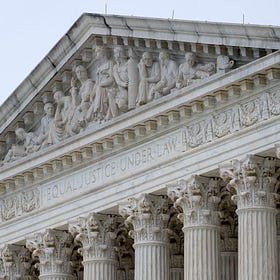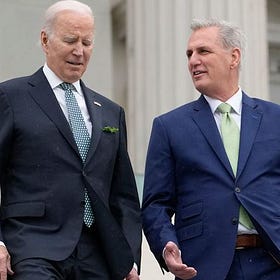Left Lane Closed Ahead
Why are Joe Biden's primary challengers coming only from the right?
The 2020 Presidential election was widely understood as the most-important in modern American history. The choice between Joe Biden, who has demonstrated throughout his decades-long political career that he does not share my values, and Donald Trump, an anthropomorphized id seemingly bereft of all morality, was unpleasant but easy. As a swing-state voter I proudly did my part to deny Trump a second term, even as doing so meant supporting a man who’d boasted that he had “no empathy” for my generation.
The 2024 campaign is shaping up to be very similar, right down to whom the presumptive candidates are. Given Trump’s increasingly authoritarian and vengeful tone, the future of American democracy may well be on the ballot. On one side is a man who supports draconian immigration policies and building the border wall; whose foreign policy approach was largely authored by Jared Kushner; who downplayed the severity of an ongoing pandemic, against the advice of experts like the World Health Organization and Dr. Anthony Fauci; who is content to look on while an activist Supreme Court dictates minoritarian policy; who abides anti-vaccine dog-whistling and Holocaust revisionism from his advisors; who has a lengthy history of bizarre offensive remarks and inappropriate behavior towards women; and whose fans compartmentalize or rationalize moral transgressions that they would rightly condemn from the other side of the aisle: Joe Biden. The other choice is Trump, about whom it goes without saying that everything in the preceding sentence also applies.
Still, for left-leaning voters, there is one major difference between the incipient Presidential election and the last one. The 2020 Democratic primary featured a genuine debate about the party’s ideological direction. Biden represented the moderate wing of the party, but he was not alone: Pete Buttigieg, Amy Klobuchar, and especially Michael Bloomberg (among other less-successful candidates) promoted centrist visions for the platform. On the other end of the political spectrum, Bernie Sanders, one of the most-progressive federal office-holders of my lifetime (and probably yours), and Elizabeth Warren, a staunch liberal, earned significant support as bannermen of the party’s left flank.
No one expected this year’s Democratic primary to be as lively as the last one — it’s considered uncouth to challenge an incumbent President from within their own party. Yet Biden’s approval rating is in the gutter and majorities of Democrats have told pollsters they want another option in 2024. Meaningful factions of the party disagree with Biden on some of the biggest political questions of our day: on how urgently to address climate change, on our country’s support for the brutal devastation in Gaza, on whether maintaining the façade of a nonpartisan judiciary is more important than reproductive and civil rights. There is significant appetite, even if probably not a winning coalition, for someone to challenge Biden from the left.
So why are the only serious candidates in the race running to his right?
Of the scores of candidates who are technically running against Biden, only one other aspiring nominee has held major political office: Dean Phillips, a three-term Congressman from Minnesota. Phillips’ pitch has focused on electability more than policy, arguing that Biden’s unpopularity and age would set him up to lose a rematch with Trump. To the extent that there is ideological daylight between Phillips, a member of the moderate (and inaptly named) Problem Solvers Caucus, and the arch-institutionalist Biden, it’s revealing that Phillips has been advised by longtime Republican operative Steve Schmidt. Over the first several weeks of his campaign, his biggest specific policy critique of Biden was bizarre claim that the President is insufficiently supportive of Israel. Phillips’ stated platform is arguably to the left of Biden’s after his out-of-the-blue sort-of-endorsement of Medicare for All last month, but color me skeptical about the sincerity of that evolution.
The more famous name in the race is Robert F. Kennedy Jr., who is currently campaigning as an independent, but who initially declared he was running against Biden for the nomination and who is strongly associated with the Democratic Party through his family. Ideologically, Kennedy is best known for promulgating unscientific conspiracy theories, including about vaccines and COVID-19. His stated campaign positions include banning abortion after the first trimester, opposition to gun control, and even-greater pro-Israeli jingoism. Whatever liberal bona fides he accrued from his environmentalist and antiwar activism have surely been erased by his multiple recent incidences of making horrifically anti-Semitic remarks.
The only other Democratic contender whom you may have heard of is Marianne Williamson, a self-help guru who is on her way to perennial-candidate status yet has never held elected office. She is presenting herself as an unapologetic progressive, as she did in 2020, but calling her a serious candidate strains credulity — and doing so would require reckoning with Williamson’s own unscientific medical dogma. Even if you include Cornel West, the leftist scholar who is running as a third-party candidate (and therefore is not relevant to the Democratic primary), there is conspicuous tension between his ideological reputation and his campaign messaging. West announced his Presidential run on Rumble, an alt-right video platform, in an interview with actor-turned-conspiracy-theorist Russell Brand. He initially accepted, then only very begrudgingly returned, a large donation from Harlan Crow, the Nazi memorabilia collector now infamous for being Clarence Thomas’ patron. What does that say about whom West’s campaign is courting?
When I cast my primary ballot four years ago, Biden had already sewn up the Democratic nomination. Meaningless as it was, I was proud to vote for Sanders, who I believed at least broadly shared my values in a way that Biden did not. I had looked forward to casting a similar protest ballot this time around. Yet on the eve of this effectively uncontested primary, I find myself contemplating the strange notion that voting for Biden this spring as a statement against the reactionary forces trying to capitalize on leftist discontent may somehow be the truest expression of my values. [Note: The “Uncommitted” movement to protest the War in Gaza has since changed this calculus.]
The lack of a real primary challenge from the left is universally recognized as a boon to Biden’s reelection bid. The general political-science consensus is that most party rank-and-file come home in November regardless of their earlier factionalism, especially in this era of heightened polarization, but reducing his exposure to internecine squabbling surely doesn’t hurt. (In a just world, the moderates who constantly decry progressive critiques of party leadership as helping Republicans would notice where this year’s infighting is actually coming from; I won’t hold my breath.)
Yet I can’t help but wonder if there is a cost to the dearth of progressive representation. As dispiriting as the outcome in 2020 was — the moderate wing closing ranks around Biden once Sanders emerged as the frontrunner; older voters who talk about leaving a better world for their children ignoring what the younger generations believed that would mean — we saw that the left wing of the party at least had a voice. We heard candidates speak to our values. We had leverage over the platform. We knew there were people in the party who took our issues seriously. And for all the serious critiques to be made of this administration, it showed.
Left-wing disillusionment will be a considerable obstacle for Biden in November — one that is only growing along with the administration’s complicity in the destruction of Gaza. However appalled you are by the thought of the disaffected staying home, the widespread consternation over their potential abstentions shows how crucial they are to the Democratic coalition. As an experienced reluctant Biden voter, having an outlet to express discontent before November makes the lesser-of-two-evils compromise easier. Feeling like a valued part of the coalition through ideological representation is a stronger motivator than being scolded to “vote blue no matter who.”
It’s hard to blame any of party’s liberal leaders for not challenging Biden. You could probably count the potential candidates who’d have even the slight possibility of winning on one hand. It wouldn’t be worth the time, effort, and political capital to run an almost-assuredly doomed vanity campaign, to say nothing of inviting the blame if Biden subsequently lost in November. As has been the case for nearly a decade now, the Democrats’ main goal is beating Trump. But as the intra-party frustration with Biden shows, that primary concern is not the only thing that matters.






I'm more curious about the ideology of 28, assuming Trump doesn't win, which would make 28 moot. Harris and Newsome are likely in the lead, with some younger centrists like Buttigieg, Wilmer, and maybe Pritzker. From the left-er side, maybe Khanna, maybe AOC. I'm personally intrigued by Mark Kelly given his gun stances.
Never thought about primaries from this angle. Interesting stuff. Reminds me of 1) why the electoral college is dumb and 2) the benefits of parliamentary government. By popular vote, the left would have more power and the trumpian/far right would be marginalized. We can dream.